- Home
- Michael D. Britton
The Release
The Release Read online
The Release
by
Michael D. Britton
* * * *
Copyright 2012 by Michael D. Britton / Intelligent Life Books
Roderick’s titanium-plated laser cannon punched a rough hole through the trolls’ stony defensive wall.
And through the wall that defined our reality.
“Do you see that?” I yelled through the smoky air as trolls scattered in all directions. Crouching behind our own stockade of palm timbers, I peered across the dusty ground littered with bodies and spent ammunition shells.
Roderick lifted his aviation goggles off his dirty face to reveal clear blue eyes, and stared at the shifting, shimmering tunnel that occupied the space ahead of us.
On this side, a war-torn chunk of dirt with a few small leafless trees and brown, thorny shrubs.
On the other side, our long lost home.
Home.
The vision seemed impossible – a view of the craggy, snowcapped Wasatch Mountains rising above the glassy office buildings and temple spires of Salt Lake City.
“It’s London!” cried Roderick, a smile forming on his lips. “It’s the ruddy West End!”
It had to be a mirage. How could he mistake Salt Lake for London? Or, how could I mistake jolly old England for Utah? Maybe there was another explanation.
Here on our phantom island in the Bermuda Triangle, explanations were a dime a dozen – trouble was, they were all conjecture.
There was not even a way to know for sure how long I’d been here.
Me and my F-16 Tomcat hit the so-called Devil’s Triangle at fifteen hundred hours on 6 May 1999. I came across this island, but made several attempts to get away from it, as it was not my destination. Every direction I flew led right back here. I finally ran out of fuel and had to land, and that was the last time my chronometer functioned.
Time seemed very abnormal on the island.
The ancient mariners disagreed – they said we were all crazy. But Roderick, the Brit who claims to be from the year 2027, says that time is irrelevant here. He and the mariners had been arguing for centuries – or minutes – about the whole thing, sometimes coming to blows over it.
But then the trolls came.
Seventy-five hundred of the huge, hairy, brutes appeared one day on some kind of golden galleon the size of three aircraft carriers, and the first thing they did upon reaching the beach was attack our community of eight thousand misplaced misfits.
Ever since then, we’ve been fighting this war.
Setting aside our apparent difference of perception, I yelled at Roderick over the sound of machine gun fire covering us from behind, “Could that be the way out?”
An arrow whooshed through the air and struck the rough tan bark of a tree trunk right next to my head, and I promptly ducked to the ground as the arrow’s shaft vibrated in place like a high-speed metronome. Roderick brought his laser sighters up to his eyes and stared toward the gaping hole in the troll wall, examining the vision that appeared in its center.
“I can see it clear as day with these,” he said. “It’s definitely London. “But I don’t understand how it could be here on this island in the middle of the bloomin’ ocean.”
“This island isn’t even supposed to be here,” I reminded him. “Lemme see.”
He handed me the laser sighters, and I raised my head just enough to see through a gap in the fortifications.
“Sorry, Rod, but that is not London. I can clearly see the skyline of Salt Lake.”
A flaming rock the size of a bowling ball landed between us with a deep thump, throwing up sand that stung against my arms and neck.
“We gotta move,” Rod shouted, grabbing our arms and moving back toward the rest of our squad.
Our forward assault mission may not have taken out many trolls, but it had resulted in some very valuable recon. When we got back to the squad, huddled in a bamboo and palm-leaf shack built against the rugged cliffs, I told them what we’d seen.
“Look,” I said, “I don’t know why we saw it differently – maybe it’s some kind of portal that takes us each back to our own homes – wherever that may be.”
“But either way,” said Roderick, biting into a banana and continuing with his mouth full, “we’ve gotta get back there and find out what it is. This could be our ticket outta here.”
Captain James Tipton, a Navy man who insists it’s still 1945, piped in. “Are you saying this – port hole – is a way to get back to where we belong?”
“Anything’s possible,” I said, knowing full well that was true. There I was on an island in the Bermuda Triangle that’s not on the maps, surrounded by people from different decades – different centuries – fighting a war with pointy-eared nine-foot trolls.
Yeah, anything’s possible.
“How do we get to it? It’s in troll territory,” said Marley, a flight attendant from 1952. Although she claimed to have been here with the rest of her passengers and crew for a couple decades, she didn’t look a day over twenty-five. She’d cut her long blond hair short and become a real scrapper since the war started, taking out countless trolls herself – a few of them in hand-to-hand combat.
I strolled to the door of the stuffy hut and peeked out through the eye-level wooden horizontal slats. The breeze outside cooled my face as I surveyed the area. Our position in the cliff face that looked down a deep-green foliage-lined ravine toward the beach of white sand had strengths and weaknesses. We could see any attack coming, since there was only one way in. But we were also trapped if a large scale assault team of trolls were to find its way here, since there was no other way out.
We were one of six contingents on our half of the island - made up of military men and women (there were plenty of us), along with volunteer civilians who we’d trained. The women and children who couldn’t fight were all secreted in an underground cavern in a small mountain about five clicks inland under heavily armed guard. That’s also where we kept most of our provisions.
“We take it by force, of course,” said Ty, a mustachioed former marine from 1983 who’d seen heavy action in Vietnam. “If this is what we think it is, we have no choice – it’s all or nothing.” He pulled his thick, dark brown hair back into a pony tail and spat on the floor of the hut. “Let’s take it to those ugly devils once and for all.”
“We should not delay,” said Turner, a freighter captain from 1926. He still wore his black belly-high pants with suspenders over a dirty white shirt with missing collar. “If what you saw appeared out of nowhere, it might not stick around.”
“He’s right,” said Tipton. “We gotta move on this now.”
“Okay,” I said. “Roderick – you have any tricks up your sleeve that can help us, here?”
“I’m running low on those,” Roderick said. “Sixteen flash bombs, five laser rifles – though only three of ‘em have any charge – a sonic bazooka, the laser cannon, and six quantum whips.”
“We could really use the other five squads,” said Marley. “With our conventional weapons, and Rod’s fancy stuff, and enough numbers, we could charge their stronghold and take the portal.”
“We don’t have time to send a runner, have them gather themselves together and march here,” said Tipton. “We’ll have to make do with the six of us. Once we’ve secured the port hole we can send for the rest, then figure out how to use it to get us all home.”
“Portal,” I said.
“Huh?”
“It’s portal, Captain.”
Tipton just shrugged.
“Well, what are we waiting for?” asked Ty. “Let’s arm ourselves to the teeth and go teach them trolls a lesson.”
We’d never really established a chain of command, since it was hard to say if a Captain from 1945 outranked a lieutenant from
1971 or a major from 2016. Rather than argue about it, we just banded together and made decisions by consensus as much as it was possible. So, we all just started to gather our weapons and head out.
As we reached the white sandy beach, the sun was dipping toward the clear blue ocean as it did every few hours before reversing course, spiraling counter clockwise and then dipping toward the center of the island, never quite reaching any horizon.
A warm, wet wind blew in off the clear, salty water, rustling the giant green palm leaves along the shore, bringing with it a fresh sea air that I only wished was closer to home. We carried our gear and approached our makeshift stockade, where it was eerily quiet.
The immense troll galleon, docked offshore about a quarter mile, appeared empty as a ghost ship. Then we spotted two trolls standing several yards from the pulsating portal, which to my eyes still displayed a view of Utah.
Roderick placed an ear bud in his left ear and brought up his gamma mic, targeting the trolls

 Turn the Page
Turn the Page Checkmate
Checkmate A Slave to Race
A Slave to Race The Only
The Only Convergence
Convergence Red Death
Red Death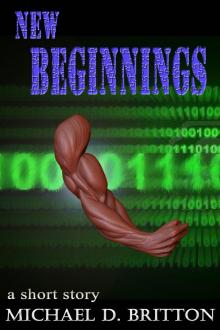 New Beginnings
New Beginnings Liberation
Liberation Old Wounds
Old Wounds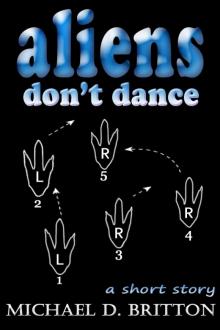 Aliens Don't Dance
Aliens Don't Dance Tag-Alongs
Tag-Alongs Broker
Broker Pause
Pause Predict THIS
Predict THIS AaBack's Grimm: Dark Fantasy Fairy Tale #2 Friends Reunited: The Janus Beast, The Rose Beauty, And The Cursed Duckling
AaBack's Grimm: Dark Fantasy Fairy Tale #2 Friends Reunited: The Janus Beast, The Rose Beauty, And The Cursed Duckling Unsettling Things & Other Stories
Unsettling Things & Other Stories Ask Grench
Ask Grench Strings
Strings Going to the Dogs
Going to the Dogs Switch
Switch Statute Forty-Nine
Statute Forty-Nine Brain Storm
Brain Storm Royal Flush
Royal Flush Time and Again: A Collection of Crazy Chronology
Time and Again: A Collection of Crazy Chronology Edge of Human
Edge of Human A Sense of Souls
A Sense of Souls Decisions, Decisions
Decisions, Decisions Dream Soldiers
Dream Soldiers Spies: 7 Short Stories
Spies: 7 Short Stories Prowler: Three Haunting Tales
Prowler: Three Haunting Tales The Release
The Release Lunar Tales - an anthology
Lunar Tales - an anthology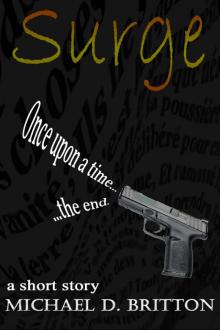 Surge
Surge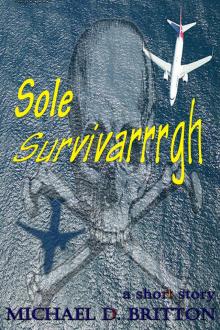 Sole Survivarrrgh
Sole Survivarrrgh Remember
Remember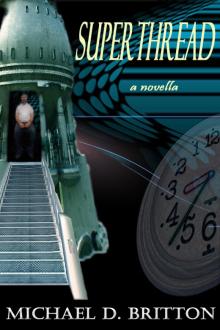 Superthread
Superthread Deceive the Paradox
Deceive the Paradox Project: Dreamer
Project: Dreamer No Man to Trifle With
No Man to Trifle With Diaspora
Diaspora Quartet for Three
Quartet for Three The File
The File These Dark Electrons
These Dark Electrons Honored: 7 Honorable Mention Stories from the Writers of the Future Contest
Honored: 7 Honorable Mention Stories from the Writers of the Future Contest Balls
Balls The Final Testament
The Final Testament The Exile
The Exile OtherPlace
OtherPlace